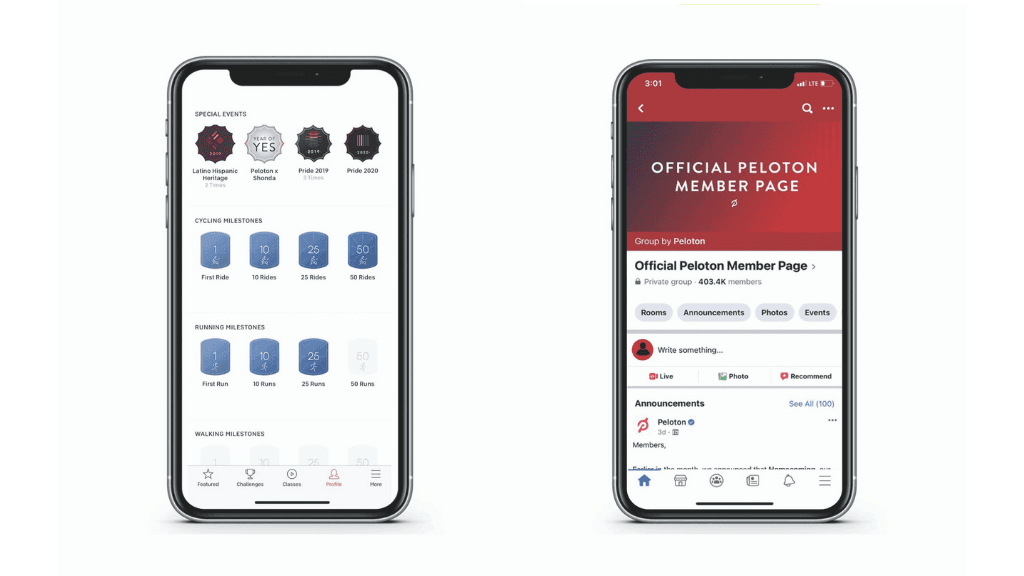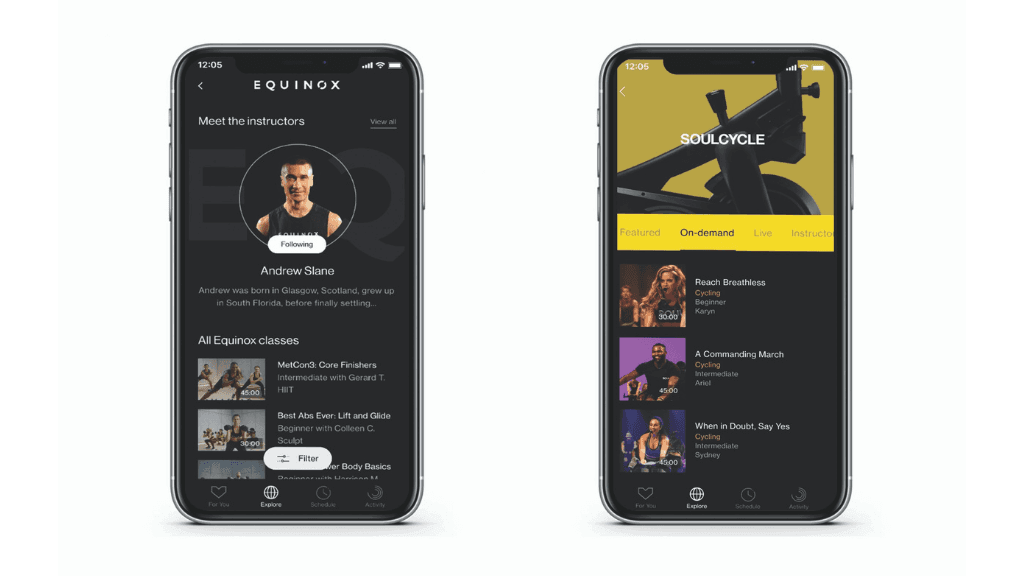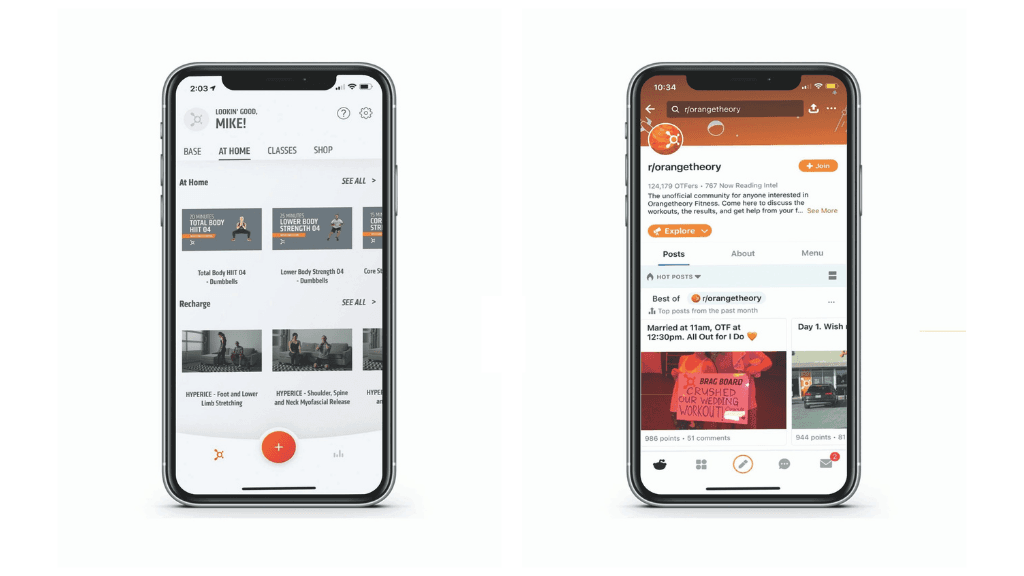


By fostering a sense of community, fitness brands face off on how to best develop loyalty.
Fitness brands have an enormous, inherent advantage when it comes to loyalty: People are often passionate about their exercise routines. How many other categories are there where customers feel guilty—or even lonely—if they fail to interact with a brand on a regular basis?
Competitiveness, community and a drive toward achievement are built into exercise routines, so it’s natural for fitness brands to use gamification, such as the earning of badges, to direct and accentuate those elements. Likewise, many consumers love to share their workouts and accomplishments through online communities and social media, from the highly monitored Facebook to the Wild West of Reddit. What does that mean for fitness brands? They have a natural edge in building loyalty on an emotional level.
“Some of the top fitness brands, like Peloton, are using digital as a first approach, and others, including Equinox, SoulCycle and Orangetheory, are being forced into it. Regardless, all of them have a great opportunity to really become ingrained in the lifestyles of their customers,” says Tim Thomas, vice president of technology, specializing in loyalty program design, at Epsilon.
Although none of the following fitness brands have formal loyalty programs, all have fiercely loyal customers. Their loyalty strategies highlight personalization and gamification to encourage engagement and to collect valuable first-party data. And they’re meeting their customers where they play, across various platforms to create strong connections.
At-home cycling is the core experience for Peloton, which uses a real-time data dashboard to spur competition among exercisers, even if they can’t see one another. The company shipped its first bikes in 2014 and added a treadmill in 2018. The Peloton app also offers virtual classes for yoga, outdoor running, meditation, stretching and strength training.

Peloton intentionally does not have a formal loyalty program, though it leverages personalization and gamification to build emotional loyalty through shoutouts, badges and status. The brand also fosters competition and community with its at-home product by collecting and sharing live workout data from its users. How does that contribute to the platform’s stickiness?
Thomas’ take: Gamification is built into the model here, whether it’s competition among community members or personal achievements and badges for users. There’s a lot of opportunity around that, both because of the type of data they’re tracking and because of the competitive nature of sports-based activities like cycling. People have that mindset already, and Peloton is smart to build on that.
While Peloton has a limited app subscription available, an elite membership (which includes full access to classes and user metrics) means having to purchase one of the company’s bikes or treadmills. Is that high barrier to entry a threat to the health of the platform?
Thomas’ take: Peloton does offer monthly pricing models for its hardware—customers can split the cost of their bike across many months. In fact, Peloton spends a lot of time and energy on its website helping users justify the cost of the hardware, letting them calculate the cost of an annual gym membership compared to a Peloton bike or treadmill. This is smart—using tools to help customers see the value of the investment and how it’s comparable to other similar fitness investments they’re already making. It’s a key move to encourage more people to buy the product, which ultimately makes the community more compelling when there are more people on the platform.
While some Peloton instructors have robust followers on social media, the primary community forum for Peloton riders is a Facebook group that includes more than 400,000 members. Peloton embraced this group early rather than trying to build community on an owned channel. What are the advantages and risks of that strategy?
Thomas’ take: This is a form of emotional loyalty—literally being part of the club. The conversation is largely up to the community. You have people talking among themselves. This can lead to great user-generated content, word of mouth and free market research. Companies dream of having this many people weigh in on ideas. On the other hand, there’s a lack of control. People can compare and complain if the brand is personalizing rewards or experiences.
Before Peloton’s launch, SoulCycle was the premium cycling brand, known for high-energy studio classes with an exclusive dance-club vibe—similar to the ethos of the big-city gyms operated by its parent company, Equinox. A new app, Equinox+, combines Equinox’s various brands, including SoulCycle, Pure Yoga and Precision Run, in an attempt to gain a share of the home-fitness market. It initially launched under the name Variis in 2020, but the company rebranded to Equinox+ in early 2021—likely to harness the fitness club’s brand recognition.

Equinox+’s marketing emphasizes the individual instructors, which aligns with the SoulCycle ethos of building up its trainers as influencers and celebrities. In fact, its most famous instructor, Angela Manuel-Davis, left SoulCycle in 2019 and co-founded a new fitness brand, Aarmy. Is a focus on instructors a good strategy from a loyalty perspective?
Thomas’ take: In some cases, you’re more loyal to the instructor than to the brand, so as long as they can keep that tie-in—“we’re the brand that has brought you these great trainers”—then emphasizing them is a great thing. Of course, it’s also a risk because if a given instructor leaves your brand, as Manuel-Davis did, people may be interested in following them. But generally, it’s worth it, because you’re building a stickier relationship. That human connection is a benefit.
Equinox+ offers virtual classes (some of which are live) for its brands on its app. How can a shift to digital be successful?
Thomas’ take: It really boils down to whether the feel and excitement of the classroom experience comes through in the app. It’s a worthy endeavor to try to re-create the vibe and sense of exclusivity that SoulCycle has created in its studios and Equinox has in its gyms. It can work—excitement can still come across very well in a digital environment, as eSports has proven. And the live classes help create a sense of urgency. On the other hand, a digital model could also appeal to users who prefer a less social or competitive experience.
The workouts at Orangetheory studios—there are more than 1,300 worldwide—put a data-driven spin on traditional exercise classes by emphasizing a particular heart-rate range (the “orange” zone) that the company says is especially beneficial for burning calories. Orangetheory’s free app enables both members and nonmembers to take part in workouts at home or on the road, but the company’s digital experience isn’t its main objective.

Orangetheory’s digital experience is intended to supplement, rather than replace, the studio experience. What do you think of that strategy—and how much control of marketing should they have over their franchises?
Thomas’ take: Pre-COVID, that was a great idea. But now this feels like a feeble attempt at entering the digital space because the brand still has that brick-and-mortar emphasis. While people are going back to gyms slowly, more people have started to enjoy working out at home.
Loyalty in general is much more problematic with a franchise-based business: You don’t have that centralized group that can decide to pursue a strategy to offer richer promotions to customers because the question of who has the closest relationship with the end user is complicated. So that’s a huge challenge, and when you add that to going digital, you’re facing two substantial headwinds.
Orangetheory aficionados have congregated on Reddit. A large part of the appeal of that platform is that early-morning gym-goers can share the details of the day’s workout routine with other members. How does Reddit affect community and the brand’s ability to influence the conversation and promote loyalty?
Thomas’ take: Reddit is the polar opposite of Facebook in terms of a brand’s ability to monitor or control the activity. It’s the Wild West. You have to be very careful, because there’s potential for things to go badly, fast. If there’s a negative perception of your brand shared on Reddit that gets upvoted and starts trending, it’s likely to filter out to the broader social universe—Twitter, Facebook—before you even realize it’s happened.
The other thing here in terms of loyalty is the potential for offer-sharing. If you’re trying to bring exclusive loyalty offers or promotional-type items, there’s a risk that people share that information quickly on these channels, and everyone in the network takes advantage. That can mess with your economics pretty substantially.
For more content like this, download the full second issue of CORE here.

Image credits: Max-Kegfire / Ostill / Istock / Getty Images Plus